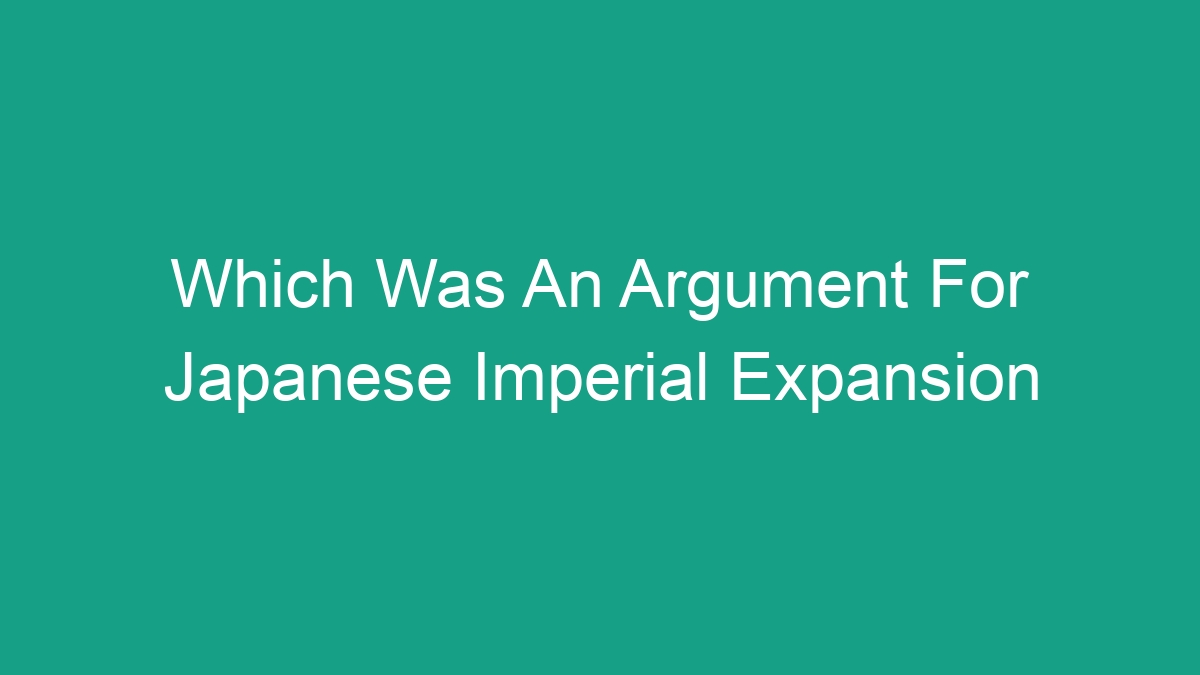
Japanese Imperial Expansion refers to the period of time in which the Empire of Japan sought to expand its territorial control and influence throughout East Asia and the Pacific. This expansionist policy, commonly known as the Greater East Asia Co-Prosperity Sphere, was driven by a number of arguments and rationales. This article will explore the various justifications that were used to justify Japanese Imperial Expansion.
The Desire for Natural Resources
One of the key arguments for Japanese Imperial Expansion was the desire to secure access to vital natural resources. Japan, as an island nation with limited natural resources, relied heavily on imports to sustain its industrial and military capabilities. The Japanese government and military leaders believed that by expanding their empire, they could gain control over important resources such as oil, rubber, and metals, effectively reducing their reliance on foreign suppliers.
This argument was particularly significant in the context of the global economic depression of the 1930s, which severely impacted Japan’s economy. The need to secure access to essential resources drove Japan to pursue expansionist policies in order to safeguard its economic interests.
Strategic Military and Defense Considerations
Japan’s desire to establish a defensive perimeter was a crucial argument for Japanese Imperial Expansion. The Japanese military leadership believed that by extending their territorial control, they could establish a buffer zone that would protect Japan from potential threats. The strategic significance of controlling key territories, such as the Korean Peninsula, Taiwan, and parts of China, was seen as essential for Japan’s national security.
Furthermore, the Japanese imperial expansion was driven by the aim of establishing forward military bases and securing maritime trade routes. By acquiring territories in the Pacific and Southeast Asia, Japan sought to enhance its naval and military capabilities and strengthen its position as a regional power.
Political and Ideological Motivations
The political and ideological motivations for Japanese Imperial Expansion were deeply rooted in the desire to assert Japan’s dominance and influence in the region. The concept of the Greater East Asia Co-Prosperity Sphere, propagated by the Japanese government, aimed to present Japan as a benevolent leader that would guide and support the development of Asian nations.
This notion was closely tied to Japan’s imperialistic and nationalist ideologies, which emphasized the superiority of the Japanese race and the need to establish a pan-Asian order under Japanese leadership. The Japanese government sought to portray its expansionist activities as a means of liberating Asian countries from Western colonialism and imperialism, thus garnering support for its expansionist agenda.
Economic Opportunities and Trade Expansion
The pursuit of economic opportunities and expansion of trade was another key argument for Japanese Imperial Expansion. Japan’s rapid industrialization and desire for export markets led the government to seek out territories where they could establish exclusive trading relationships and access new markets.
By expanding its empire and controlling key trade routes, Japan aimed to secure access to valuable markets and resources, thereby strengthening its economic position and fostering growth. The Japanese government also sought to establish a sphere of influence that would facilitate the exploitation of raw materials and the development of export-oriented industries in the newly acquired territories.
Reactions and Responses to Western Colonialism
Japanese Imperial Expansion was also driven by a desire to challenge and respond to Western colonialism and imperialism in the region. The aggressive expansionist policies pursued by Western powers in Asia, such as the United States, Britain, and France, prompted Japan to assert its own influence and control.
Japan aimed to position itself as a counterbalance to Western dominance and establish its own sphere of influence in Asia, thereby seeking to protect its interests and compete with Western powers for regional control and resources. The growing tension and rivalry with Western colonial powers played a significant role in shaping Japan’s expansionist ambitions and policies.
Conclusion
In conclusion, Japanese Imperial Expansion was driven by a complex set of arguments, including the need for natural resources, strategic military considerations, political and ideological motivations, economic opportunities, and responses to Western colonialism. These rationales served to justify and legitimize Japan’s expansionist policies and actions during the first half of the 20th century.
While each argument contributed to Japan’s imperial ambitions, it is important to recognize the human and geopolitical consequences of Japanese Imperial Expansion, including conflicts, occupation, and suffering inflicted upon the peoples of the territories under Japanese control. The legacy of Japanese Imperial Expansion continues to shape regional dynamics and historical narratives, underscoring the significance of understanding the arguments and rationales that drove this pivotal period in Japan’s history.


